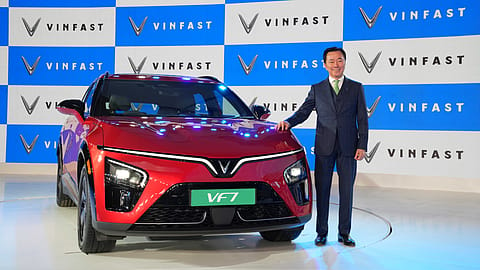Policymaking process doesn’t match the speed with which companies are moving: VinFast Asia CEO
VinFast became ineligible to avail the EV manufacturing scheme for investing months before the policy was notified.

As the government’s recently notified Scheme to Promote Manufacturing of Electric Passenger Cars in India (SPMEPCI) struggles to find any takers, Pham Sanh Chau, Asia CEO of Vietnamese carmaker VinFast, said that companies are moving much faster than the pace of policymaking.
VinFast became ineligible to avail the EV manufacturing scheme for investing months before the policy was notified.
“The process of policymaking does not match the speed with which companies are investing in India,” Chau said.
“This scheme was drafted when we were considering entering India. And now our car just rolled out from the Indian factory and that policy just completed. There is a lag. We are no more qualified. That policy is only attracting new foreign investors. We invested already here. It should have included VinFast’s investment. We came in 2024. From the moment we came in, we expressed interest in the policy,” he explained.
To encourage the manufacturing of EVs in India, the government SPMEPCI scheme slashes customs duty on electric cars with cost, insurance and freight value of $35,000 or more to 15% from the existing 100% if an automaker commits an investment of at least ₹4,150 crore and achieves 50% localisation in five years. Many in the industry have said that the scheme was tailor-made for Tesla, as it did not count earlier investments made by carmakers. Tesla, too, has not shown any interest in the scheme.
India’s biggest luxury carmaker, Mercedes-Benz India, has also given up its plans to invest under the recently notified scheme. In an interview last month, Mercedes-Benz India managing director and CEO Santosh Iyer said that the new EV manufacturing scheme is great for first-time entrants
“We have invested ₹3,000 crore in India so far. We have already been producing EVs without these policies. Our view is that this is a great scheme for first-time entrants into the Indian car market. It’s designed like that. It’s also meant for some of these players who don’t have a manufacturing presence in India,” he said.
Recommended Stories
“It doesn’t make sense for us. For new entrants, it’s a nice framework where, by the time you set up manufacturing, you continue to start business in India,” he added.
In July, the then BMW Group India CEO Vikram Pawah told Fortune India that there should be a level-playing field for new entrants and automakers that are already in India.
“The major investment by an automaker happens in the plant and building capacity. The main thing is the factory, that’s where the investment goes. We already have a factory. There is no way we can set up another factory unless we exhaust the capacity of that factory,” Pawah said.
“We are producing EVs without the policy. We put up a factory 18 years ago when the production-linked incentive (PLI) scheme for auto was non-existent. Incentives should be equal for all,” he added.
(INR CR)
Volvo, too, has no plans to apply for the EV manufacturing scheme. The scale of India’s luxury car industry is around 50,000 units annually, said Jyoti Malhotra, managing director of Volvo Car India. “Looking at the scale, I think CKD (completely knocked-down) kits offer the best solution and we are continuing with that,” he added.